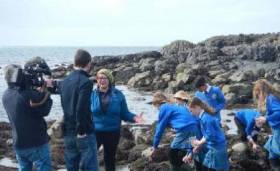Displaying items by tag: Explorers Programme
2017 a Successful Year of Increasing Ocean Literacy in Irish Primary Schools
#MarineScience - Delivered by ten centres around Ireland is The Explorers Education Programme, that met up to 15,000 primary school students, worked with over 500 school teachers and trained in excess of 100 teachers and student teachers on the east and west coasts.
In addition the Programme generated attendance from several public events reaching over 300,000 people throughout the country in 2017.
Dr Peter Heffernan, CEO, Marine Institute congratulated the centres representing the Explorers Education Programme on their delivery and supporting the Governments national marine strategy Harnessing Our Ocean Wealth, "where one of its goals is to increase Ireland's engagement with the sea. A wave of ocean literacy has hit our shores this year, and it has been incredible to see the Explorers programme go from strength to strength over the last ten years from where we started with ten schools and now are reaching 500 around the country this year. The positive feedback from the teachers and their wider communities about student's eagerness to learn about the ocean reinforces the importance of reaching out to primary schools to help build our marine science capital."
As part of the Explorers Programme interactive marine based modules are introduced in classes that include aquariums in the class, seashore safari's, and a range of marine based projects learning about marine biodiversity, marine environmental awareness and care, marine history as well as marine technology. "Over the last year we have worked with teachers assessing the level of awareness, engagement, and ocean literacy in the classroom and have seen a significant increase in the student's knowledge about the ocean around them," explained Cushla Dromgool-Regan at the Marine Institute.
"The Explorer centres midyear results showed an increase from 59% to 85% in primary school children's knowledge about the ocean nationally, which was amazing, and is a great reflection on the team of outreach officers who are visiting the schools. We are very proud to have supported the Explorers outreach centres around the country who have reached a record number of participants this year" added Cushla Dromgool-Regan.
The Explorers Education Programme aims to help promote learning and increasing our knowledge about the ocean in our communities. "At a national level the Explorers Education Programme has been recognised by teachers and schools as delivering a programme of high impact where students learn about ocean through cross curricular activities ranging from the arts to the sciences. Often the Explorer programme brings out new ideas and team work amongst the students that teachers also get inspiration from," explained Dr Noirin Burke, Galway Atlantaquaria.
The Explorers modules and resources are used to support teachers in achieving their curriculum objectives and can also help schools develop strategies for teaching sustainability topics and hands-on inquiry based lessons which are inclusive of all students needs in the classroom " Dr Noirin Burke further added.
The Explorers Education Programme is supported by the Marine Institute, and is funded under the Marine Research Programme by the Irish Government and is available for schools to take part in throughout a number of coastal counties in Ireland. For more information please visit www.explorers.ie




























































